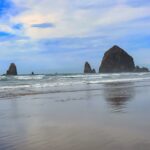Galactic Events – How to do Solar Eclipse Travel and Beyond
Did you travel to the Path of Totality for the 2024 Solar Eclipse? Often viewed as a once-in-a-lifetime event, solar eclipse travel wass a hot topic this month.
If you missed this year’s spectacular event, there’s still time to get in some galactic events this year and plan for the next total solar eclipse.
From the mystical allure of lunar eclipses to the mesmerizing spectacle of meteor showers, we invite you to discover the transformative power of experiencing these celestial events with us.
Meteor Showers
Meteor showers occur when Earth passes through the debris trail of a comet or asteroid, causing particles to burn up in the atmosphere, creating bright streaks of light known as meteors. These cosmic fireworks, often named after the constellation from which they appear to originate, can produce dozens or even hundreds of meteors per hour at their peak.
To witness a meteor shower in all its glory, choosing the right location and timing is essential. Away from the glare of city lights, remote areas with clear, dark skies offer the best conditions for meteor viewing. Additionally, planning your visit during the peak of a meteor shower, when the Earth passes through the densest part of the debris trail, maximizes your chances of seeing a breathtaking display.
Some of our favorite locations include:
- Mauna Kea, Hawaii, USA: Situated atop a dormant volcano on the Big Island of Hawaii, Mauna Kea boasts some of the clearest and darkest skies in the world. The high elevation and minimal atmospheric interference make it an excellent location for stargazing and meteor shower watching.
- Atacama Desert, Chile: Renowned for its dry climate and high altitude, the Atacama Desert is one of the driest places on Earth, with minimal cloud cover and light pollution. Its vast, open landscapes offer unobstructed views of the night sky, making it an ideal destination for observing meteor showers.
- Tenerife, Canary Islands, Spain: Home to the Teide Observatory, one of the world’s premier astronomical research centers, Tenerife boasts clear, dark skies ideal for stargazing. Its volcanic terrain and high elevation provide excellent vantage points for observing meteor showers against the backdrop of the Atlantic Ocean.
Popular times to view meteors are the Perseids in August and the Leonids in November.
Lunar Eclipses
Lunar eclipses occur when Earth aligns perfectly between the Sun and the Moon, casting a shadow over the lunar surface and transforming the Moon into a breathtaking shade of red.
As with the meteor showers, Dark Sky locations are some of the best places to view a lunar eclipse.
The next total Lunar Eclipse, according to NASA will be March 14th, 2025. This will be visible in the US.
Our recommended places to visit are:
- Death Valley National Park, California: Death Valley, with its vast desert expanses and minimal light pollution, provides excellent conditions for stargazing. The park offers designated stargazing events and programs, allowing visitors to experience the beauty of the night sky.
- Canyonlands National Park, Utah: Canyonlands National Park, with its rugged canyons and expansive vistas, provides an ideal setting for stargazing. The park’s remote location and high elevation offer exceptional visibility of the night sky, making it a popular destination for astronomers and amateur stargazers alike.
- Cherry Springs State Park, Pennsylvania: Known as one of the darkest places on the East Coast, Cherry Springs State Park is designated as a Dark Sky Park by the International Dark-Sky Association (IDA). Its remote location and strict lighting regulations make it an ideal spot for stargazing and astrophotography.
Solar Eclipse
The next total solar eclipse will happen on August 12, 2026. Expect to start seeing packages and tours for Greenland, Iceland and Spain as they will all be in the path of totality.
Another solar eclipse will happen in Egypt in 2027.
Since these are all places that our partners offer trips, expect to see some here in the future.
Better yet, sign up for our mailing list and we will let you know of any solar eclipse travel opportunities in the future.










